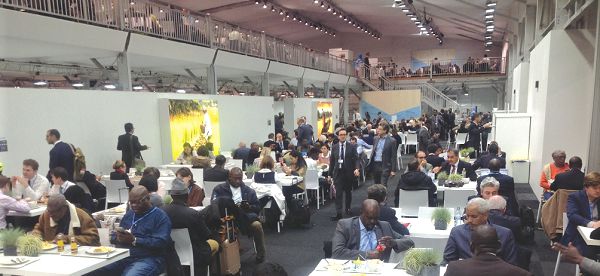
Inspiring eco-friendly initiatives worth emulating - Lessons from Germany
Globally, many nations are pursuing ambitious climate actions and sanitation practices, reducing their dependence on single-use plastics to save the planet.
Sadly, such
I came face-to-face with such reality when I visited the Koforidua Technical University’s campus at 9 a.m. on Sunday, July 8, 2018, a day after the end of the two-day congress of the New Patriotic Party (NPP).
The entire venue of the
The littering was
“Just on Sunday, after the
The story was no different at the University of Ghana when the National Democratic Congress (NDC) held its regional elections on September 1,
Advertisement
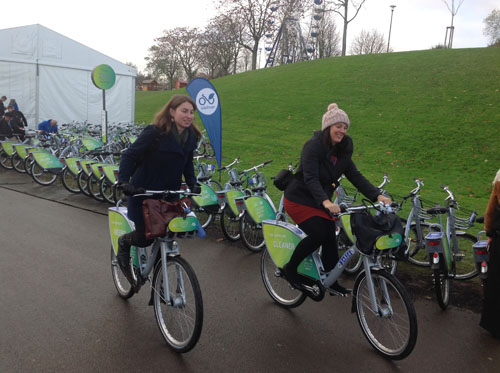 Some of the delegates relishing ride on free Nextbikes to commute from the Bula Zone to the Bone Zone for negotiation.
Some of the delegates relishing ride on free Nextbikes to commute from the Bula Zone to the Bone Zone for negotiation.
Inspiring change
It is against this that I find the eco-friendly initiatives demonstrated jointly by the German Government, the United Nations Framework Convention on Climate Change (UNFCCC) and German private-businesses at the 2017 Climate Change Conference (COP 23) in Bonn worth sharing to inspire a positive change in Ghana.
The COP, which attracted over 25,000 delegates, media and observers from all over the world, presented a mammoth logistical challenge, yet it was made as green and sustainable as possible.
It became the first UN Climate Change Conference to receive the Eco-Management and Audit Scheme (EMAS) certificate for eco-friendly performance. Here are some of the green initiatives:
Eco-friendly logistics
To curb waste, the German Government spent 175 million Euros towards the organisation of the summit that saw all the logistics such as tents, tables, chairs, couches and carpets required to provide a conducive environment for negotiations, and exhibitions by non-state actors, rented from three Bonn-based events companies that erected temporary structures at the two venues - Bonn Zone and Bula Zone.
The Spokesperson of the Federal Ministry of Environment, Mr Joachim Hummel, said as a climate change conference, the aim of Germany was to be a good example in the best eco-friendly practices to the world.
“So we looked at every single part of logistics where we can be green to reduce waste and minimise
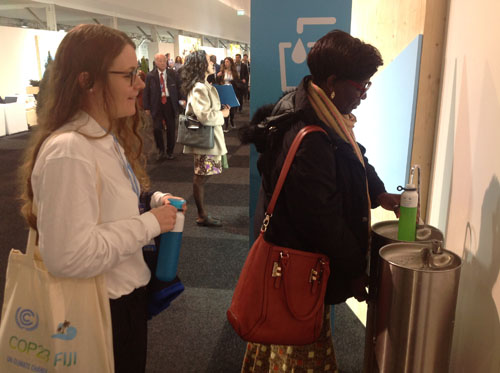 The Head of Corporate Affairs and Media Relations of the Forestry Commission (FC), Mrs Joyce Kwafo Ofori, using her refillable bottle to get water from one of the water dispensers at Bula Zone.
The Head of Corporate Affairs and Media Relations of the Forestry Commission (FC), Mrs Joyce Kwafo Ofori, using her refillable bottle to get water from one of the water dispensers at Bula Zone.
Water fountains and refillable water bottles
To provide potable water and discourage the use of disposable cups to save the environment, the UNFCCC installed drinking fountains at the conference grounds to make water available to the participants and gave reusable water bottles that reportedly helped to “save about 570,000 disposable cups”.
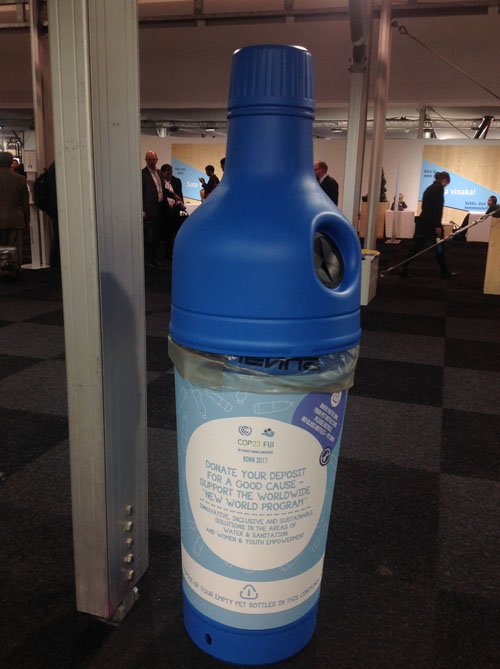
Litter
As a way of encouraging people to donate their waste deposits, the UNFCCC placed designated litter bins to allow the participants to not only give out their waste for a good cause but also segregate them into papers, bottles and plastics.
To ease the movement of the participants, Nextbike, a German company that develops and operates
A Sales Manager of Nextbike, Ms Hyde Krishneider, said: “These bikes form part of the idea of
Paperless meetings
In sharp contrast to other UN climate change conferences, COP 23 required delegates to help make negotiation meetings paperless by reading and distributing documents electronically, a process that was facilitated by fast-speed internet facilities.
“To reduce paper waste, the UNFCCC gave codes to delegates to use a specially created website to download documents and read them online. However, where printing was necessary, delegates were encouraged to use recycled paper that should be printed
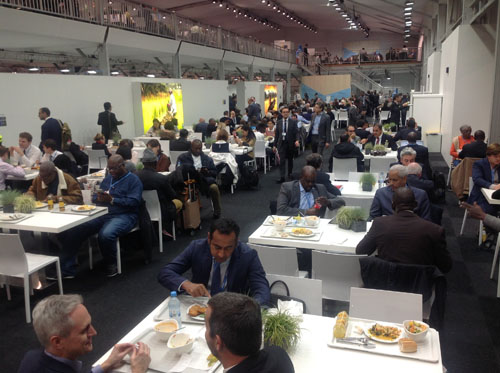 During the entire conference, reusable dishes and cutlery were used to serve food to the over 25,000 participants.
During the entire conference, reusable dishes and cutlery were used to serve food to the over 25,000 participants.
Green catering services
As part of measures to reduce food waste, the food offered at COP 23 was vegetarian with
“We considered catering services that would provide a good choice of food but at the same time not too much food to the participants to prevent reckless throwaways,” Mr Hummel explained.
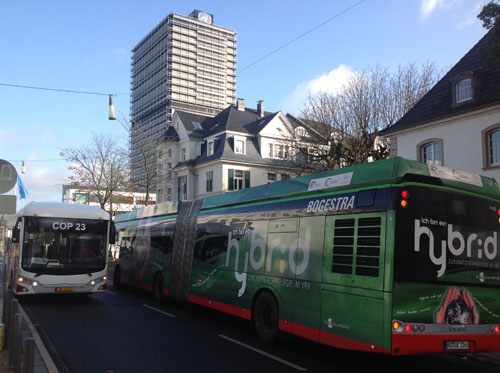 Throughout
Throughout
Electronic vehicles (EVs)
To reduce the participants’ carbon footprint as they commuted between the Bonn and Bula zones, the German Government brought in from other German cities a number of hydrogen and electronic-powered shuttles, a move that was complemented by German automobile companies that ferried Heads of States and important personalities in their latest EVs.
The EU Policy and Regulatory Affairs Manager of Hydrogen Europe, Mr Nicholas Kraus, said: “With the only emission from these cars being clean water, these hybrid cars at COP 23 represented how we see the future of mobility with zero emission.”
Given the best climate practices enumerated above, it is time Ghanaians embraced the need to take individual and collective actions to protect the environment and appreciate that a clean surrounding inures to everyone’s benefit.
Writer’s email: [email protected]